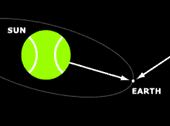
Introduction
The Sun is the star at the center of our Solar System. Stars are
big balls of gas and the only bodies in space that produce light.
Our Sun gives the Earth light and heat. All other stars are so far away
that they appear only as dots of light in the night sky.
All nine of the planets in our Solar System revolve around the Sun.
Earth is the third planet from the Sun. A year is how long it takes
for a planet to go around the Sun once. It takes Earth 365 days
to go around the Sun.
It is daytime when the side of Earth where we live is facing the Sun.
But, as the Earth spins, our side of the Earth slowly turns away from
the Sun and the sky darkens to night.
The Sun is very important for life on Earth. Humans use the light and
energy from the Sun to keep us warm, to generate electricity, to grow
food, to provide us entertainment, and much more. Without the Sun, humans
could not live on the Earth because the temperature would be much too
cold and there would be no light and energy to grow food.
1
of 3
next
»

|

|

|

|

|
G A L L E R Y |

If the Sun was no larger than a tennis ball, and the Earth no larger
than a grain of sand, how far apart would they be? [find
the answer] |
|
| M
O R E |

Learn more about the sun
at the Adler Planetarium and Astronomy Museum. |
|
|